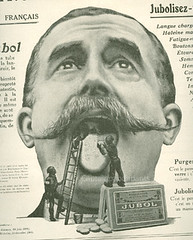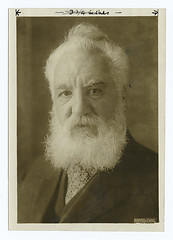Saturday, March 27, 2010
Doctor Sweany's 1895 Mustache
Doctor Sweany,
737 Market St.,
San Francisco, CAL
Opposite Examiner Office
Friday, March 26, 2010
Dr. Francisco Bertrand, President of Honduras
 Francisco Bertrand (1866–1926) was twice President of Honduras, first from March 28, 1911 to February 1, 1912, and then again between March 21, 1913 and September 9, 1919.
Francisco Bertrand (1866–1926) was twice President of Honduras, first from March 28, 1911 to February 1, 1912, and then again between March 21, 1913 and September 9, 1919.
His successor and predecessor was Manuel Bonilla.
Bertrand started out with a reputation as a conciliator, but during his last presidency was involved in armed conflict with his political opponents.
It is believed that United States of America pressure was behind his abandoning the post of President. He spent the next few years in exile before returning to La Ceiba, Honduras to die in July 1926.
Source:en.wikipedia.org/wiki/Francisco_Bertrand
Bain News Service,, publisher.Dr. Francisco Bertrand - Pres. of Honduras[no date recorded on caption card]
1 negative : glass ; 5 x 7 in. or smaller.
Notes:Title from unverified data provided by the Bain News Service on the negatives or caption cards.
Forms part of: George Grantham Bain Collection (Library of Congress).
Format: Glass negatives.
Rights Info: No known restrictions on publication.
Repository: Library of Congress, Prints and Photographs Division, Washington, D.C. 20540 USA, hdl.loc.gov/loc.pnp/pp.print
General information about the Bain Collection is available at hdl.loc.gov/loc.pnp/pp.ggbain
Persistent URL: hdl.loc.gov/loc.pnp/ggbain.12676
Call Number: LC-B2- 2653-6
Saturday, March 20, 2010
1915 Jubol Man Getting Tongue Scrubbed Ad
Thursday, March 18, 2010
President Grover Cleveland
Stephen Grover Cleveland (March 18, 1837 – June 24, 1908) was the 22nd and 24th President of the United States. Cleveland is the only president to serve two non-consecutive terms (1885–1889 and 1893–1897) and therefore is the only individual to be counted twice in the numbering of the presidents. He was the winner of the popular vote for president three times—in 1884, 1888, and 1892—and was the only Democrat elected to the presidency in the era of Republican political domination that lasted from 1860 to 1912. Cleveland's admirers praise him for his honesty, independence, integrity, and commitment to the principles of classical liberalism. As a leader of the Bourbon Democrats, he opposed imperialism, taxes, subsidies and inflationary policies. As a reformer he also worked against corruption, patronage, and bossism.
Some of Cleveland's actions caused controversy within his own party. He used the presidential veto 584 times, far more than any president before him. His intervention in the Pullman Strike of 1894 in order to keep the railroads moving angered labor unions, and his support of the gold standard and opposition to free silver alienated the agrarian wing of the Democrats. Furthermore, critics complained that he had little imagination and seemed overwhelmed by the nation's economic disasters—depressions and strikes—in his second term. Even so, his reputation for honesty and good character survived the troubles of his second term. Biographer Allan Nevins wrote, "in Grover Cleveland the greatness lies in typical rather than unusual qualities. He had no endowments that thousands of men do not have. He possessed honesty, courage, firmness, independence, and common sense. But he possessed them to a degree other men do not."
Saturday, March 13, 2010
Tuesday, March 9, 2010
Friday, March 5, 2010
Gen. Philip Henry Sheridan's Civil War Mustache
There is an anecdote told concerning Sheridan during his campaign against the
Indians. Comanche Chief Tosawi, or Silver Knife, reputedly told Sheridan in 1869, "Me Tosawi. Me good Indian," to which Sheridan is said to have replied, "The only good Indians I ever saw were dead."[46]
This was then misquoted as "The only good Indian is a dead Indian". Sheridan later denied he had made the statement to Tosawi. Earlier that year, on May 28, Rep. James M. Cavanaugh said in the House, "I have never seen in my life a good Indian ... except when I have seen a dead Indian." That remark may have been mistakenly attributed to Sheridan.
 Gen. Philip Henry Sheridan
Gen. Philip Henry Sheridan(March 6, 1831 – August 5, 1888)
Nickname: Little Phil
Place of birth: Albany, New York
Place of death: Nonquitt, Massachusetts
Place of burial:Arlington National Cemetery
Allegiance: United States of AmericaUnion
Service/branch: United States ArmyUnion Army
Years of service: 1853–88
Rank: General of the Army of the United States
Commands held: Cavalry Corps (Army of the Potomac), Army of the Shenandoah, United States Army
Battles/wars: American Civil War, Battle of Perryville. Battle of Stones River, Battle of Chattanooga, Overland Campaign, Valley Campaigns of 1864, Appomattox Campaign, Indian Wars
Wednesday, March 3, 2010
Alexander Graham Bell
(March 3, 1847 – August 2, 1922) was an eminent scientist, inventor, engineer and innovator who is credited with inventing the first practical telephone.






